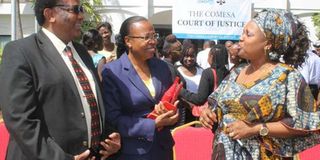Comesa court underutilised, Senior Counsel Nzamba Kitonga says

Former chairperson of the COMESA Court of Justice Nzamba Kitonga (left) with Lady Justice Mary Kasango and Mombasa County Deputy Governor Hazel Katana at the Sarova Whitesands Beach Resort and Spa in Mombasa on July 31, 2015. PHOTO | WACHIRA MWANGI | NATION MEDIA GROUP
What you need to know:
- The CCJ is the judicial arm of COMESA and handles trade disputes that occur between members states.
- The court can be accessed by all lawyers from member states who have valid practicing certificate.
Lawyers in East Africa have been challenged to take up cases before the Common Market of East and Southern Africa (COMESA) Court of Justice.
Senior Counsel Nzamba Kitonga, who is the former Judge President of the Khartoum-based court said lawyers from the region are not utilising the court.
Mr Kitonga said the distance to the court and the requirement that all local remedies must first be exhausted before a litigant moves to the court might be the reason for their absence.
He made the remarks on Friday during a publicity seminar organised by the court to create awareness of the institution to lawyers and other stakeholders in the legal fraternity.
Mr Kitonga said plans are underway to make amendments to allow litigants, should need be, to move to the court directly without going through all judicial systems in their respective member countries.
“It (court) is an ad hoc court, it does not sit full time but it is contemplated to be a full time court if there is workload,” said Mr Kitonga.
According to Mr Kitonga, the court has concluded 46 cases since 2005.
VIDEO CONFERENCING
Lady Justice Lombe Chibesakunda, who is the current president described the court as an instrument to bring integration of economies and development.
The CCJ is the judicial arm of COMESA that handles trade disputes that occur between members states and can also offer advisory opinion.
Registrar of the court Ms Lucy Mbatia said plans are underway to ensure that the court holds sessions in various member states.
She said currently, there is no sub-registry in any member state but they might be established once there are many cases.
However, Ms Mbatia said the court on its own motion can conduct its sittings in any member state.
She added that efforts are being made to make the court accessible to more litigants by enabling those with disputes to file their cases online.
“We were given a budget, we are now sourcing for a service provider. We are heading towards video conferencing, we have to go digital,” she said.
She added that they expect to have an e-platform by mid next year.
According to Ms Mbatia, the seminar in Mombasa is the third to be held among COMESA member states since the CCJ was formed.
“Others have been conducted in Swaziland and Ethiopia, if we cover all the 19 member states, our workload will be higher,” she said.
CCJ has two divisions, the court of the first instance comprising seven judges and the Appellate Court which has five judges.
The jurisdiction of the court, which can be accessed by all lawyers from member states who have valid practicing certificate, is borrowed heavily from the of the European Court of Justice.





